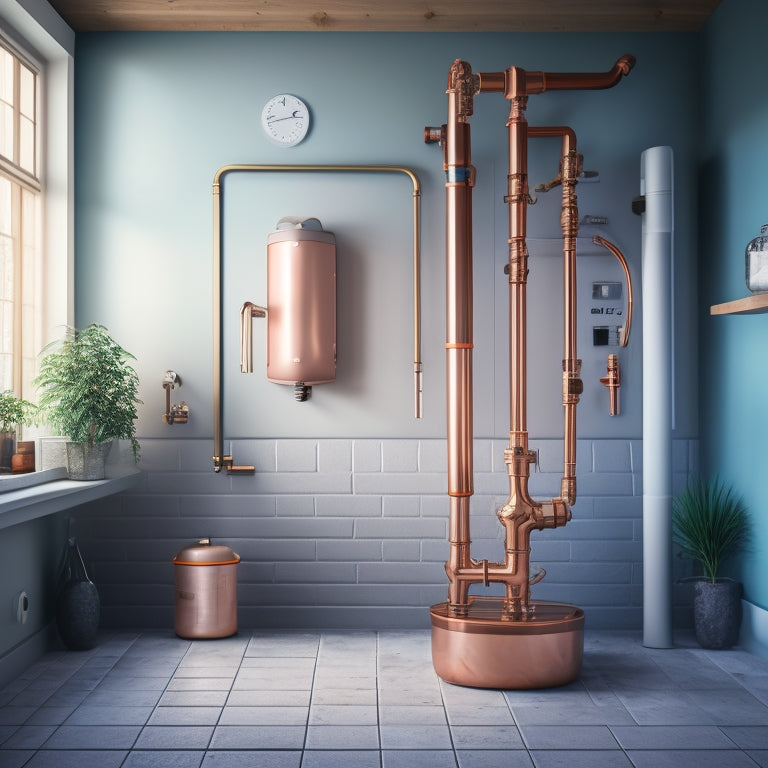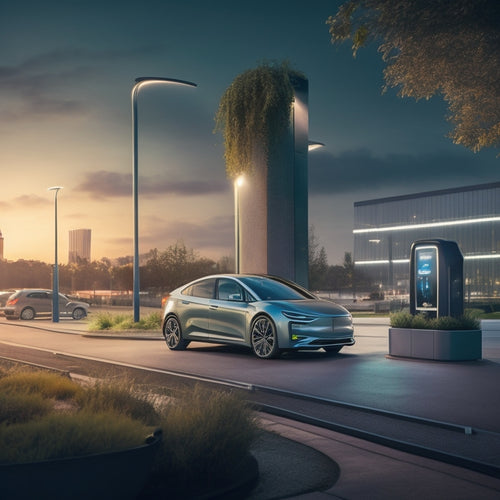
5 Tips for Home Water Heating Systems
Share
You can maximize your home water heating system's efficiency and reduce your energy bills by utilizing solar energy potential, choosing the right collector type for your climate, and sizing your system to meet your household's hot water demands. Proper installation techniques, such as insulation and strategic tank placement, also play a significant role. Additionally, regular maintenance practices like performance monitoring and inspections can help identify issues early on. By considering these factors, you'll be well on your way to optimizing your system's performance. Now, investigate the specifics of each step to access the full potential of your solar water heating system.
Key Takeaways
- Properly size your solar water heating system to meet your household's hot water demands, considering factors like household size and usage patterns.
- Insulate your system effectively using methods like foam wrapping and reflective insulation to minimize heat loss and optimize performance.
- Conduct regular system inspections every 6-12 months to check for wear, corrosion, or damage to panels and connections.
- Use timers or thermostats to reduce energy consumption and prioritize efficient energy storage solutions for enhanced efficiency.
- Monitor your system's performance by tracking energy bills, water temperature, and system pressure to identify potential issues early on.
Harnessing Solar Energy Potential
Over 70% of the average household's energy consumption is attributed to water heating, making it an ideal application for utilizing solar energy potential. You can greatly reduce your energy bills by utilizing this potential.
Solar water heating systems provide a clean and renewable source of energy, reducing your reliance on fossil fuels and lowering your carbon footprint. This, in turn, minimizes the environmental impact of your home's energy consumption.
Incorporating solar systems can lead to lower energy bills and enhanced energy independence, promoting self-sufficiency in energy consumption energy storage systems. By choosing the right battery type, such as lithium-ion or lead-acid, you can guarantee peak performance and longevity.
Choosing the Right Collector Type
When selecting a solar water heating system, you need to reflect on the type of collector that best suits your needs. The collector type affects the system's efficiency, durability, and cost. You'll want to evaluate factors like collector materials, collector orientation, and your local climate.
| Collector Type | Characteristics |
|---|---|
| Flat-Plate Collectors | Made of copper or aluminum, with a selective coating to maximize heat absorption. Ideal for temperate climates. |
| Evacuated Tube Collectors | Consist of rows of glass tubes with a vacuum between them, providing excellent insulation. Suitable for colder climates. |
| Integral Collector Storage (ICS) Systems | Combine the collector and storage tank into one unit, often made of fiberglass or polypropylene. Simple and cost-effective. |
| Concentrating Collectors | Use mirrors or lenses to focus sunlight onto a smaller area, achieving high temperatures. Typically used in industrial applications. |
Sizing Your Solar Water Heater
Your solar water heater's performance relies heavily on its size, which must be carefully calculated to meet your household's hot water demands. A correctly sized system guarantees you'll have enough hot water when you need it, while also maximizing energy savings.
To determine the ideal system capacity, take into account factors such as your household's size, hot water usage patterns, and climate. When selecting a DIY solar power system, it's crucial to take into account energy efficiency measures to lower overall consumption.
A general rule of thumb is to install a system that can provide 1.5 to 2 gallons of hot water per person per day. Oversizing can lead to increased costs and reduced efficiency, while undersizing may not meet your hot water needs.
Installing for Maximum Efficiency
Having accurately sized your solar water heater, you're now ready to focus on installing it for maximum efficiency.
To achieve this, make certain your system is properly insulated to minimize heat loss. Use effective insulation techniques such as wrapping pipes with foam insulation or applying reflective insulation to reduce radiant heat loss.
Moreover, implement energy-saving practices like installing the tank in a well-insulated location, away from cold walls and floors. Additionally, consider installing a timer or thermostat to optimize your system's performance and reduce energy consumption.
By utilizing efficient energy storage solutions and prioritizing battery life cycles, you can minimize energy waste and enhance overall system efficiency.
Maintaining Your Solar System
During the lifespan of your solar water heater, regular maintenance is vital to guarantee peak performance and longevity.
You'll need to perform system inspections every 6-12 months to confirm your solar system is functioning correctly. Check for signs of wear and tear, corrosion, or damage to the panels, pipes, and connections.
Performance monitoring is also essential to identify any issues early on. You can do this by tracking your energy bills, water temperature, and system pressure. Monitor for any unusual patterns or fluctuations that may indicate a problem.
Frequently Asked Questions
Can I Use a Solar Water Heater With a Septic System?
While ancient civilizations utilized the sun's power, you're wondering if you can too - with a septic system. Yes, you can use a solar water heater, reaping benefits like lower energy bills, but consider your septic system's hydraulic load and potential backup power needs.
How Often Should I Drain Sediment From My Water Heater?
You should drain sediment from your water heater every 6-12 months to prevent sediment buildup, which reduces efficiency and lifespan; regular water heater maintenance guarantees peak performance and helps prevent costly repairs or replacements.
Are Solar Water Heaters Compatible With Well Water Systems?
You're not alone in wondering if solar water heaters can work with well water systems - and the answer is a resounding yes! With solar panel efficiency reaching up to 80%, you'll need to take into account installation factors like water quality, flow rate, and system sizing for a seamless integration.
Can I Install a Solar Water Heater on a Flat Roof?
When considering solar heater installation, you'll need to assess your flat roof's structural integrity, ensuring it can support the added weight and wind resistance of the solar panels, and accommodate necessary roofing penetrations for secure mounting.
Do Solar Water Heaters Work During Power Outages?
When the grid goes dark, you're left high and dry - unless you've got a solar water heater that can capture the sun's power even during outages, ensuring you enjoy hot showers and significant energy savings, thanks to its impressive solar efficiency.
Related Posts
-

Solid State Batteries in Electric Vehicles
Solid-state batteries revolutionize electric vehicles by offering a longer lifespan and higher energy density than tr...
-

Solar Phone Chargers for Camping Essentials
Solar phone chargers are must-haves for your camping essentials, allowing you to stay connected while enjoying nature...
-

Renewable Energy Solutions to Reduce Your Carbon Footprint
To reduce your carbon footprint, adopting renewable energy solutions is key. Using solar panels or wind turbines can ...


